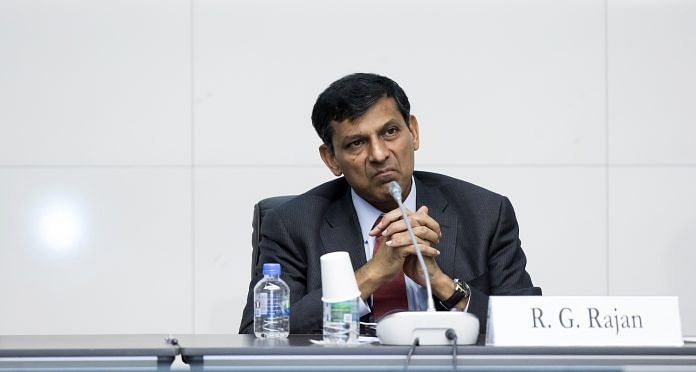The economists want political parties to use their suggestions for inclusive and sustainable growth when they set their poll manifestoes.
New Delhi: You know Ocean’s 11, 12 and 13. So what is Rajan’s 13? Caution: These are really smart and nice people, not another heist gang.
Chicago University Professor and former RBI governor Raghuram Rajan has brought together 13 top economists of Indian origin to draft an economic reform agenda for India for the next few years. And New Delhi’s elite economist-bureaucratic community has been quick to name them Rajan’s 13.
Last Friday, the group presented their economic agenda for India.
Besides Rajan, the other economists who have penned the five-year economic agenda for India across a host of issues, including the macroeconomy, health, education, banking reforms and infrastructure, are Abhijit Banerjee, Gita Gopinath, Neelkanth Mishra, Karthik Muralidharan, Eswar Prasad, Sajjid Chinoy, Amartya Lahiri, Rohini Pande, E. Somanathan, Pranjul Bhandari, Prachi Mishra and Maitreesh Ghatak.
The recommendations, a set of old and new reform measures, aim to put India onto a high inclusive and sustainable growth trajectory.
The economists strive to point out that none of them have any political affiliations and want their recommendations to be taken by political parties ahead of the manifesto-setting exercise as constructive feedback and criticism.
Also read: India’s growth not leading to jobs, farm loan waivers don’t help poor – Raghuram Rajan
The 13 economists
A look at the 13 economists shows that many of them have earned degrees or have taught at Harvard, have linkages with the Abdul Jameel Poverty Action Lab (J-Pal) and have worked closely with Rajan at some point in their academic or professional careers.
1) Raghuram Rajan: Currently a professor of finance at University of Chicago’s Booth School of Business, he has held the posts of Reserve Bank of India governor, chief economic adviser in the finance ministry and chief economist at the International Monetary Fund (IMF).
2) Karthik Muralidharan: A professor of economics at the University of California, San Diego, he has a Ph.D. in economics from Harvard and is a board member at J-Pal.
3) Abhijit Banerjee: A professor of economics at the Massachusetts Institute of Technology, he was one of the founders of J-Pal and remains one of its directors.

4) Gita Gopinath: Currently the chief economist at IMF, she has taught at Harvard and University of Chicago’s Booth School of Business.

5) Prachi Mishra: The managing director and chief India economist at Goldman Sachs, she has worked closely with Rajan at the RBI where she was a specialist adviser.
6) Eswar Prasad: Currently a professor at Cornell University, Prasad and Rajan were colleagues at IMF’s research department and have published many papers together.
7) Sajjid Chinoy: He is currently the chief India economist at JP Morgan.

8) Maitreesh Ghatak: He is a professor of economics at the London School of Economics.
9) Pranjul Bhandari: She is the chief India economist at HSBC.

10) Neelkanth Mishra: He is a managing director and India economist and strategist at Credit Suisse.
11) Amartya Lahiri: He is a director at RBI’s Centre for Advanced Financial Research and Learning.

12) E. Somanathan: He is a professor at the Indian Statistical Institute.
13) Rohini Pande: She is a professor at Harvard Kennedy School and has links with J-Pal.
Recommended reforms
The group of economists flagged jobless growth and the need to preserve macroeconomic stability and not trade it off for higher growth that can be used by opposition parties to question the track record of the Modi government on these crucial parameters.
They advocated low and stable inflation, a consolidated fiscal deficit of less than 5 per cent that leaves enough space for private investment and a sustainable current account deficit that can be financed by capital flows to maintain macro-economic stability.
They also advocate long-pending land and labour reforms, including allowing multi-year fixed-term labour contracts, greater decentralisation of power to states and local bodies, and overhauling the Right to Education Act to ensure better learning outcomes.
The economists also favoured doing away with government mandates for state-run banks for lending to specific sectors as well as a more independent board-led process for appointment of chiefs of these banks.
Also read: Loan waivers & lending targets for banks are signs of lazy govt, Raghuram Rajan says
Experts welcome move
“I think it is a positive move,” said N.K. Singh, chairman of the 15th Finance Commission, on the economists coming together to set the agenda. “This will generate a greater public debate and consciousness and encourage policymakers to think of both macro and structural reforms which will improve our growth trajectory.”
On the specific recommendation by the group to incentivise states to align with the Centre’s fiscal goals, Singh said, “Indeed, one of the terms of reference of the Finance Commission is to suggest a credible path of fiscal consolidation and overall macroeconomic management for the Union and the states. As far as the Union is concerned, the FRBM (Fiscal Responsibility and Budget Management) report has been accepted in the last Budget which gives the fiscal roadmap for the central government. As far as states are concerned, given the wide divergences both on the fiscal deficit and debt figures, it is a challenge for the commission to seek a convergence with the pattern consistent with both the practicality of fiscal compression and credible overall macro management.”
D.K. Srivastava, chief policy adviser at Ernst & Young India and a member of the 12th Finance Commission, agreed with the economists that growth is not creating enough jobs.
“I think the government has gone for a capital-intensive strategy so far. In order to increase employment, we need to focus on the services sector and the informal sector. We need to encourage sectors where less capital per unit of output is employed. We can generate much better employment through this strategy rather than the prevalent jobless growth,” he said.




Indian origin and not indians,like fourth empire nowhere involved in the match except decision making.Do they no the ethos of the Indians, talking about farmers without knowing anything about the struggle?
1. If this is all they have recommended then what is new and pathbreaking in these recommendations?
2. As regards fiscal prudence and inflation management, even this Govt.s worst critics must agree that this govt. has stayed the course admirably well despite, sometimes, at the cost of facing resentment from people (not buckling under popular pressure to bring down prices of petrol and diesel, as an example). Govt. has substantially improved the position since it took over from UPA-II.
3. There is nothing on agricultural sector, at least from the highlights mentioned above. This is an important challenge for any govt. I wish they said something on different suggestions like changing of cropping pattern, introduction of GM crop, marketing of agri produce and MSP etc.
4. The suggestion that more thrust should be on service sector for creating job is obvious from the days of Adam Smith.
5. Instead one wished they come out with some concrete proposals..
A welcome move.We should give them an opportunity to tell us what is GOOD for India.
I agree with the comments made by Sanjiv Bhatla. I have the following points of criticism to this list:-
1. Most in the list are not based in India.
2. Most are probably westernised in their attitudes and are not aware of Indian behavioural culture.
3. Most have not worked with the Indian bureaucratic, political or judicial systems.
4. Most believe that they are highly qualified but considering the little competition they do face in their own field in the USA compared to India, I am highly surprised that they are not taken as economic advisors in USA or UK itself.
5. Nearly half of them are already employed by private investment bankers and consultancies. Thus, there is a conflict of interest here like Rajat Gupta.
6. We have seen a procession of foreign based Indian intellectuals in the past few years including Rajan. Any layman in India can put forward his observations as follows:- First, they will not stay longer than 3 years and want to get back to their comfortable lives. Second, as long as they are in employment here, they are not able to think or act independently. Third, unlike civil servants, who live and die in the Indian Civil Services and can always be held accountable for their actions legally in this country, India does not have any jurisdiction over these intellectuals. Fourth, after they quit their posts, they declare their objections which should have been their job when they are in the posts.
7. All of them are detached from ground realities. If their ideas do work well, let us take the example of agricultural subsidies. Till now, even a rich and powerful nation like USA has not been able to wean off its own agricultural base from subsidies.
8. As regards to IMF & World Bank economists, we have already seen how they have pushed third world countries into debt in the past 25 years and have suggested measures like monetising basic natural resources like water which have made people even poorer in countries like Venzuela.
9. Finally, the prime mover in economics is the people who act i.e the general population, business community, politicians etc. The economists are merely armchair critics. Please note that while Rajan was not willing to allow farm loan waivers for TDP government in AP, his esteemed colleagues and seniors like Manmohan Singh and Amartya Sen are all for it and have done so several times.
Economic thinking on India should be the ‘art of the possible’ in the light of the political grammar of India and the implementability of suggested measures.
With all due respect for Dr Rajan, one cannot help noticing that barring perhaps two, all these economists are based abroad. Economics is anyway a non quantifiable science — you cannot say that if you increase the parameter X by this amount, the result will change by Y amount. There are so, so many parameters that produce a particular result. Some of these parameters can be locale specific, or behaviour-specific of the locals. I am sure there are many good economists in India itself who know the subject very well and also the people and local constraints very well. Why not build a team with a fair share of such names?
Who raised the point of jobless growth? I think ‘gurumurthy’
Immediate effect on salary paid by the government to the permanent employees is a must to cut down for creating a balanced economic distribution among the mass as if employment is created in large scale across the country besides doing away with the extreamhording surplus salary of the government employees like a kind of sacrifice for the betterment of the country.
Are these the only recommendations for the serious ills of Indian economy by the top Indian economists in the world? What is new and different about them and something which is not already known? If the hidden purpose is to lend a helping hand to the opposition, then this is game. However, ground realities of real politic will not allow many of these recommendations to be implemented. Besides, I don’t see any thought provoking solutions for farm distress. It is easy to criticize Modi for under delivery of his tall promises but his government has walked the talk on many issues and has creditable performance on macro economic parameters. I am sure most of the people will view this gathering as another junket during December when everyone is on a Christmas holiday anyway!
https://www.bloombergquint.com/global-economics/an-economic-strategy-for-india-by-rajan-gopinath-and-others-full-report
You can read the entire report here. And it does talk about farming sector reforms
Bharat wants freebies, subsidies, loan waivers and for that economists are not needed, Rabri Devi will do.
Dr Rajan is FM material.
If the informal sector is contributing to job creation, should we really be treating “ formalisation of the economy “ as a virtue ?